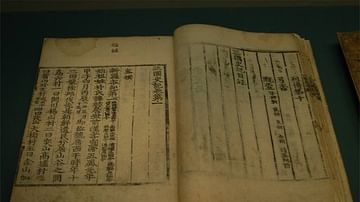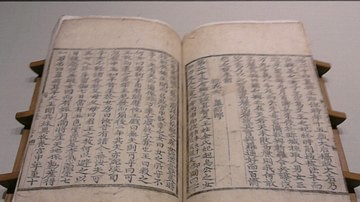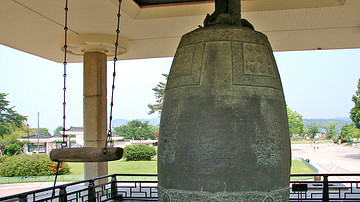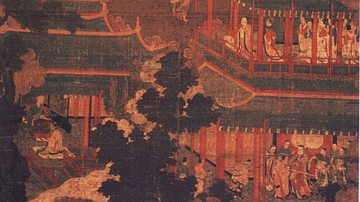Hyangga was a form poetical 'country song,' distinct from contemporary Chinese songs, which were written in the Silla and Goryeo kingdoms of ancient Korea between the 7th and 10th century CE. The indigenous songs cover such topics as love, loss, and Buddhist devotion. The majority are written in couplets arranged in four-line stanzas with each line having four syllables. The ninth line, where there is one, invariably begins with an interjection, raising the speaker's intonation and signalling the finale of the song which usually contains a wish, command, or exclamation. The poems were designed to be sung accompanied by music and dancing. Only 25 hyangga survive, but they were once widely written and performed, including by such famous figures as Won Hyo, the Buddhist philosopher-monk. All translations are taken from A History of Korean Literature edited by P.H. Lee.

'Song of a Comet' (Hyesong ka) was composed in 594 CE by Master Yungchong, the performance of which reportedly worked a miracle not once but twice when it saw off a comet – traditionally an inauspicious omen and often referred to as a long-tailed star – and a fleet of Japanese pirates.
There is a castle by the Eastern Sea,
where once a mirage used to play.
Japanese soldiers came,
Torches were burnt in the forest.
When knights visited this mountain,
The moon marked its westerly course
And a star was about to sweep a path,
Someone said, “Look, there is a comet.”
Ah, the moon has already departed.
Now, where shall we look for the long-tailed star?
'Song of Sodong' (Sodong yo) is credited to King Mu of Baekje (Paekche). It was composed c. 600 CE in order to win the affections of Princess Seonhwa, daughter of Chingpyeong, king of the Silla kingdom.
Princess Sonhwa
After a secret affair,
Steals away at night,
With Sodong in her arms.
'Ode to Yangji' (Pungyo) is by an unknown poet and dated to c. 635 CE. It praises one Yangji, a monk master-artist credited with creating the massive statue of Buddha at Yongmyo Monastery. The song reminds of the Buddhist belief that all things perish and good deeds should be done while possible.
We've come, have come, have come,
How sad, we have come! -
Sad are the living beings.
We have come to garner merit.
'Prayer to Amitayus' (Won Wangsaeng ka) dates to c. 661-681 CE and was composed by either the monk Kwangdok or his wife. Amitayus is the personification of Infinite Life which lies far to the West.
O moon,
Go to the West, and
Pray to Amitayus
And tell
That there is one who
Adotes the judicial throne, and
Longs for the Pure Land,
Praying before him with folded hands.
Ah, would he leave me outstanding
When he fulfills the forty-eight vows?
'Ode to Knight Chukchi' (Mo Chukchirang ka) written by Tugo c. 692-702 CE who praises his master.
All living beings sorrow and lament
Over the spring that is past;
Your face once fair and bright
Is about to wear deep furrows.
I must glimpse you
Even for an awesome moment.
My fervent mind cannot rest at night
In the mugwort-rank hollow.
'Dedication of the Flower' (Honhwa ka) was composed in the first decades of the 8th century CE and sung by an old herdsman. One day the herdsman meets Lady Suro, wife of Lord Sunjong, and her entourage touring the countryside. The lady asks for an azalea flower growing on a high cliff, but the only person to respond is the herdsman. Giving Lady Suro the flower he sings:
If you would let me leave
The cattle tethered to the brown rock,
And feel no shame for me,
I would pluck and dedicate the flowers!
'Regret' (Wonga), composed in 737 CE, is a reproach of King Hyosong by the aristocrat Sinchung after the king broke a promise.
You said you would no more forget me
Than the densely green pine
Would wither in the fall.
That familiar face is there still.
The moon in the ancient lake
Complains of the transient tide.
I still glimpse your figure,
But how I dislike this world.
'Ode to Knight Kipa' (Chan Kiparang ka) was composed c. 742-765 CE and is a song of praise for Kipa, a member of the aristocratic youth group, the hwarang. It was written by Master Chungdam.
The moon that pushes her way
Through the thickets of clouds,
Is she not pursuing
The white clouds?
Knight Kipa once stood by the water,
Reflecting his face in the Iro.
Henceforth I shall seek and gather
Among pebbles the depth of his mind.
Knight, you are the towering pine
That scorns frost, ignores snow.
'Song of Tuista Heaven' (Turinnorae) was composed in 760 CE by Master Wolmyong in response to a request from King Gyeongdeok following the appearance of two suns for 10 days.
O flowers strewn today
With a song. Since you attend
My honest mind's command,
You serve Maitreya!
'Requiem for the Dead Sister' (Chae mangmae ka) was composed c. 762 CE by Master Wolmyong in honour of his lost sister:
On the hard road of life and death
That is near our land,
You went, afraid,
Without words.
We know not where we go,
Leaves blown, scattered,
Though fallen from the same tree,
By the first winds of autumn.
Ah, I will polish the path
Until I meet you in the Pure Land.
'Hymn to the Thousand-Eyed Bodhisattva Who Observes the Sounds of the World' (To Chonsu Kwanum ka) was composed c. 762-765 CE by Huimyong. It describes the prayer of a mother to a painting on the wall of a monastery to restore the sight of her son.
Falling on my knees,
Pressing my hands together,
Thousand-Eyed Sound Observer,
I implore thee.
Yield me,
Who lacks,
One among your thousand eyes,
By your mystery restore me whole.
If you grant me one of your many eyes,
O the bounty, then, of your charity.
'Statesmanship' (Anmin ka) is another song by Chungdam. Composed in 765 CE, it compares government with the family.
The king is father
And his ministers are loving mothers.
His subjects are foolish children;
They only receive what love brings.
Schooled in saving the masses,
The king feeds and guides them.
Then no one will desert this land -
This is the way to govern a country.
Ah peace and prosperity will prevail if each -
King, minister, and subject – lives as he should.
'Meeting with Bandits' (Ujok ka) was composed by the monk Yongjae c. 785-798 CE and describes his encounter with a band of 60 bandits while in the mountains. Fortunately, the thieves knew of Yongjae's talents and asked him to compose a song. So moved were they by the composition that the bandits shaved their heads and became monks themselves.
The day I did not know
My true mind -
Now I am awakened from ignorance
And am going through the forest.
Transgressors hiding in the bushes,
You can turn your merits to save others,
If I'm stabbed to death,
Then a good daw will dawn.
Ah, this much good deed
cannot build a lofty edifice.
'Song of Choyong' (Choyong ka), composed in 879 CE, is perhaps the most famous of all hyangga. The title character is the son of the Dragon King of the Eastern Sea who one night after a party returns home to find his beautiful wife being seduced by the Spirit of Smallpox. Choyong was forgiving, though, and in return, the spirit promised never to enter a house which had a portrait of our hero on the door. Choyong has been identified as a shaman for his calm yet magical success in dealing with the spirit, while the latter may be a metaphor for the ills of the world. This is the song which Choyong sang so charmingly to the spirit so that he left in peace:
Having caroused far into the night
In the moonlit capital,
I returned home and in my bed,
Behold four legs.
Two were mine;
Whose are the other two?
Formerly two were mine;
What shall be done now they are taken?
The remaining surviving hyangga all come from the 'Ten Vows of Bodhisattva Samantabhadra' (actually eleven songs) collection written by the great poet-scholar monk Master Kyunyo (923-973 CE). The most celebrated of these calls for the turning of the dharma wheel. In the last couplet, the moon is used, as was typical in Buddhism, as a metaphor for enlightenment.
To the majestic assembly of buddhas
In the dharma realm,
I go forth and pray
For the dharma rain.
Disperse the blight of affliction
Rooted deep in the soil of ignorance,
And wet the mind's field of living beings,
Where good grasses struggle to grow.
Ah, how happy is a moonlit autumn field,
Ripe with the fruit of knowledge.
This content was made possible with generous support from the British Korean Society.





